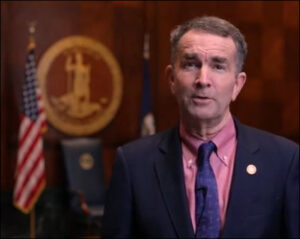by James A. Bacon
In its first media briefing about Virginia’s response to the COVID-19 coronavirus epidemic, the Northam administration said yesterday that public health officials are on top of the situation and that, for the moment, Virginians are at low risk of infection.
The state set up an Incident Management Team in January, shortly after the virus was identified in China. The experts are leading the state’s planning and response, and they are in close communication with government and private-sector partners, state officials said.
“The Commonwealth is taking this public health issue seriously, and we have a plan in place to respond to COVID-19,” said Governor Ralph Northam in a prepared statement. “We have a plan, we are executing it, and we are prepared.”
Details of the plan were sparse, however. State epidemiologist Lilian Peake, the COVID-19 incident commander, said the team is meeting daily. The main tangible action cited in the press release was the tracking of the virus.
“The Virginia Department of Health is closely monitoring the virus, to understand where it has appeared and to learn from the experiences of local communities around the world,” said Secretary of Health and Human Resources Daniel Carey. “While the risk is still low here in Virginia, state agencies are focused on preparation efforts, and we are encouraging Virginians to practice good hygiene measures and continue following updates from state and federal health officials.”
Much of the Governor’s press release was devoted to warning against misinformation and urging Virginians to take common-sense precautions such as avoiding close contact with sick people, covering coughs and sneezes, and washing hands with soap and water for 20 seconds. The administration also warned against the “stigmatization of certain populations” such as individuals of Asian descent.
During the media briefing, state officials provided additional information not contained in the press release. Writes the Richmond Times-Dispatch:
State health officials said Virginia has acquired two testing kits provided by the U.S. Centers for Disease Control and Prevention — which issues only one test kit at a time. Each kit can test 50 to 60 people, depending on the quality of the sample and the need for validation, said Denise Toney, the state lab director.
The test kits allow Virginia to test for the virus in-house and yield faster results. Right now, someone tested for the coronavirus in Virginia would have results within 24 to 48 hours, health officials said.
Northam’s administration anticipates the state’s preparedness for the potential pandemic will cost $9.7 million — with $3.7 million to be spent in the first 90 days and the rest within 12 months. Of that, about $6.1 million will be spent on protective gear and about $1.5 million on media and print materials.
Bacon’s bottom line: Much was left unsaid and unaddressed about what plans the Governor has in store should the virus reach epidemic proportions in Virginia. Some obvious questions arise based on actions that public health authorities have taken in other states and countries. Under what circumstance might the Governor suggest (or order):
- The shutdown of public schools?
- The cancellation of public events?
- The curtailment of public transit?
- Other measures to slow the spread of the disease?
How well prepared are Virginia hospitals to handle a surge of COVID-19-infected patients? What is their emergency room capacity? What is their intensive-care capacity? What flexibility do hospitals have in reallocating resources internally to accommodate an influx of patients with acute respiratory illness?
In that regard, Virginia Hospital & Healthcare Association (VHHA) issued a press release yesterday that answered none of those questions but did illuminate the bureaucratic structure within which hospitals are operating. Under a partnership created in 2002, the VHHA is working with the Virginia Department of Health to prepare for and recover from natural and manmade disasters, the statement said. Virginia has six regional health care coalitions designed to “foster collaborative planning efforts between health care facilities, first responders, and community partners at the local and regional levels.”
If we’re lucky, the COVID-19 hysteria is way overblown, it will spread less rapidly and be less deadly than feared, and it will prove far less disruptive to the economy here in Virginia than it has been in China. I would not be surprised by such an outcome. But it’s the Governor’s job to prepare for a worst-case scenario. He says the state has a plan, but it’s still not clear what that plan is.



